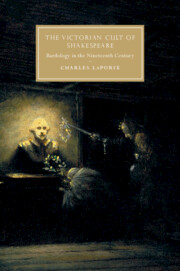Book contents
- The Victorian Cult of Shakespeare
- Cambridge Studies In Nineteenth-Century Literature And Culture
- The Victorian Cult of Shakespeare
- Copyright page
- Dedication
- Contents
- Figures
- Preface
- Acknowledgments
- Introduction
- Chapter 1 Shakespearean Sermons and Other Pious Texts
- Chapter 2 The Harmonies and Beauties of Devotional Shakespeare Volumes
- Chapter 3 The Sonnets and the Messiah
- Chapter 4 The Authority of the (Missing) Author
- Chapter 5 Shakespearean Clerisies and Perfect Texts
- Conclusion: Concealed Wonders and Choice Treasures
- Notes
- Selected Bibliography
- Index
- Cambridge Studies in Nineteenth-Century Literature and Culture
Chapter 5 - Shakespearean Clerisies and Perfect Texts
Published online by Cambridge University Press: 30 October 2020
- The Victorian Cult of Shakespeare
- Cambridge Studies In Nineteenth-Century Literature And Culture
- The Victorian Cult of Shakespeare
- Copyright page
- Dedication
- Contents
- Figures
- Preface
- Acknowledgments
- Introduction
- Chapter 1 Shakespearean Sermons and Other Pious Texts
- Chapter 2 The Harmonies and Beauties of Devotional Shakespeare Volumes
- Chapter 3 The Sonnets and the Messiah
- Chapter 4 The Authority of the (Missing) Author
- Chapter 5 Shakespearean Clerisies and Perfect Texts
- Conclusion: Concealed Wonders and Choice Treasures
- Notes
- Selected Bibliography
- Index
- Cambridge Studies in Nineteenth-Century Literature and Culture
Summary
Chapter Five, “Shakespearean Clerisies and Perfect Texts,” concerns the activities of the Victorian Shakespeare societies and the ways that textual debates about Shakespeare throughout the century reproduce and inflect similar debates among Biblical scholars. Shakespeare’s cultural apotheosis raises persistent questions not just about the nature of his authorship, but also about the integrity and order of his oeuvre.During the eighteenth and nineteenth centuries, as David Scott Kastan puts it, “the desire to recover the lost perfection of [Shakespeare’s] text becomes ever more intense.” Here, once more, we see a clear parallel to Biblical studies.For Shakespeare’s oeuvre, like the Bible, admits endless questions about which readings ought to be most authoritative.And in both cases, the textual problem became a theological one for believers who held that an inspired text ought to be uniform and consistent. Moreover, since textual difficulties in sacred texts have higher stakes than in secular ones, so too Shakespeare’s emergence as a companion to the evangelists prompts further exegesis and, eventually, helps to bolster the development of academic criticism.
- Type
- Chapter
- Information
- The Victorian Cult of ShakespeareBardology in the Nineteenth Century, pp. 121 - 145Publisher: Cambridge University PressPrint publication year: 2020

